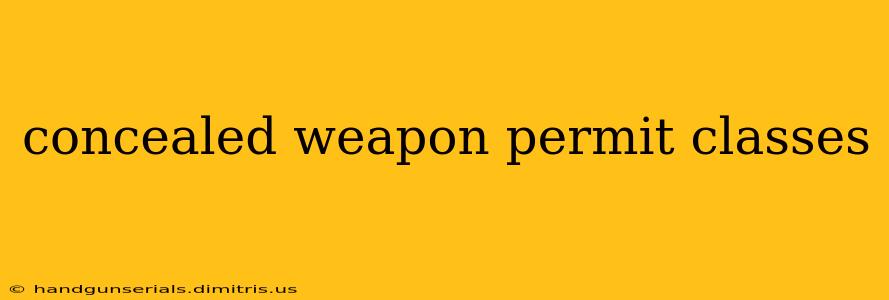Obtaining a concealed weapon permit (CWP) is a significant decision, requiring thorough preparation and understanding of your state's laws and regulations. This guide delves into the crucial role of concealed weapon permit classes and helps you navigate the process effectively. We'll cover everything from what to expect in a class to finding reputable instructors and understanding the benefits of professional training.
Why Take a Concealed Weapon Permit Class?
While specific requirements vary by state, most jurisdictions mandate or strongly recommend completing a CWP class before issuing a permit. These classes aren't just a box to check; they're essential for responsible gun ownership. Here's why:
-
Legal Compliance: Classes ensure you're fully aware of the laws governing concealed carry in your state. This includes understanding legal limitations, justifiable use of force, and the potential legal ramifications of using a firearm. Ignorance of the law is no excuse.
-
Safe Gun Handling: Proper handling, storage, and maintenance of firearms are paramount for safety. Classes provide hands-on training, reinforcing safe practices to prevent accidents.
-
Self-Defense Techniques: Many classes integrate self-defense strategies and tactics, teaching de-escalation techniques and responsible use of force. This empowers you to make informed decisions in high-stress situations.
-
Live Fire Practice: A critical component of most CWP classes involves live-fire exercises at a shooting range. This allows you to practice your skills in a controlled environment, building confidence and proficiency.
-
Legal and Ethical Considerations: Beyond the mechanics of firearm use, reputable classes address the legal and ethical dimensions of self-defense, including the concept of duty to retreat (where applicable).
What to Expect in a Concealed Weapon Permit Class
The curriculum will vary slightly depending on the instructor and state requirements, but most classes cover these key areas:
-
Firearm Safety Rules: These are the fundamental principles that govern safe gun handling and storage.
-
State Laws Regarding Concealed Carry: This section provides a detailed overview of your state's specific regulations on concealed carry, including permitted locations, prohibited locations, and legal ramifications of non-compliance.
-
Use of Force and Self-Defense: This often includes legal definitions, ethical considerations, and practical scenarios designed to help you make sound judgments in self-defense situations.
-
Firearm Maintenance and Cleaning: Proper maintenance prolongs the life of your firearm and ensures its reliable operation.
-
Live Fire Range Practice: This practical component allows you to apply the knowledge gained in a controlled environment.
Finding a Reputable Concealed Weapon Permit Class Instructor
Choosing the right instructor is crucial. Look for instructors with:
-
Extensive Experience: Experienced instructors bring valuable insights and expertise to the class.
-
Positive Reviews and Recommendations: Check online reviews and ask for referrals from other gun owners.
-
Focus on Safety: Safety should be paramount in any CWP class.
-
Clear Curriculum: Make sure the class covers all the necessary topics required for your state's CWP.
-
Professional Credentials: Check for any relevant certifications or affiliations with reputable organizations.
Beyond the Classroom: Continuous Learning
Obtaining a CWP is just the beginning. Responsible gun ownership requires ongoing training and practice to maintain proficiency and safety. Consider:
-
Regular Range Practice: Consistent practice is key to maintaining skills and building confidence.
-
Advanced Training Courses: Explore advanced training options to enhance your skills and knowledge.
-
Staying Updated on Laws: Gun laws can change, so stay informed about any updates or modifications that affect your permit.
By diligently completing a high-quality concealed weapon permit class and committing to ongoing training, you'll not only meet legal requirements but also significantly enhance your safety and preparedness. Remember, responsible gun ownership is an ongoing commitment to safety and ethical conduct.

